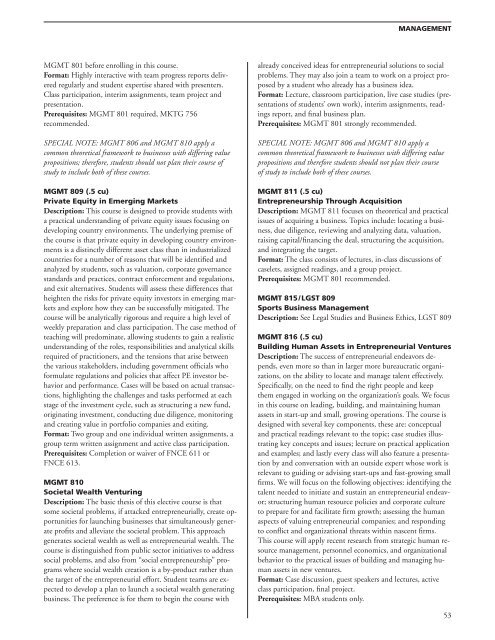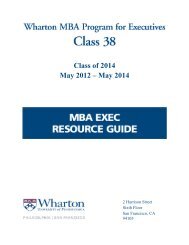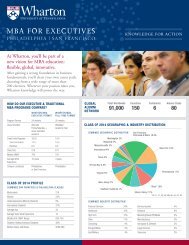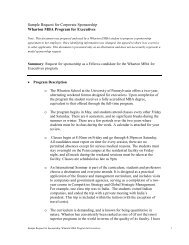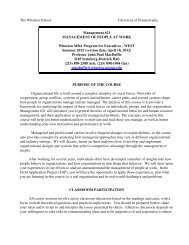Explore Options; Plan Your MBA Academic Program
Explore Options; Plan Your MBA Academic Program
Explore Options; Plan Your MBA Academic Program
You also want an ePaper? Increase the reach of your titles
YUMPU automatically turns print PDFs into web optimized ePapers that Google loves.
MGMT 801 before enrolling in this course.<br />
Format: Highly interactive with team progress reports delivered<br />
regularly and student expertise shared with presenters.<br />
Class participation, interim assignments, team project and<br />
presentation.<br />
Prerequisites: MGMT 801 required, MKTG 756<br />
recommended.<br />
sPecial note: MGMt 806 and MGMt 810 apply a<br />
common theoretical framework to businesses with differing value<br />
propositions; therefore, students should not plan their course of<br />
study to include both of these courses.<br />
MGMT 809 (.5 cu)<br />
Private Equity in Emerging Markets<br />
Description: This course is designed to provide students with<br />
a practical understanding of private equity issues focusing on<br />
developing country environments. The underlying premise of<br />
the course is that private equity in developing country environments<br />
is a distinctly different asset class than in industrialized<br />
countries for a number of reasons that will be identified and<br />
analyzed by students, such as valuation, corporate governance<br />
standards and practices, contract enforcement and regulations,<br />
and exit alternatives. Students will assess these differences that<br />
heighten the risks for private equity investors in emerging markets<br />
and explore how they can be successfully mitigated. The<br />
course will be analytically rigorous and require a high level of<br />
weekly preparation and class participation. The case method of<br />
teaching will predominate, allowing students to gain a realistic<br />
understanding of the roles, responsibilities and analytical skills<br />
required of practitioners, and the tensions that arise between<br />
the various stakeholders, including government officials who<br />
formulate regulations and policies that affect PE investor behavior<br />
and performance. Cases will be based on actual transactions,<br />
highlighting the challenges and tasks performed at each<br />
stage of the investment cycle, such as structuring a new fund,<br />
originating investment, conducting due diligence, monitoring<br />
and creating value in portfolio companies and exiting.<br />
Format: Two group and one individual written assignments, a<br />
group term written assignment and active class participation.<br />
Prerequisites: Completion or waiver of FNCE 611 or<br />
FNCE 613.<br />
MGMT 810<br />
Societal Wealth Venturing<br />
Description: The basic thesis of this elective course is that<br />
some societal problems, if attacked entrepreneurially, create opportunities<br />
for launching businesses that simultaneously generate<br />
profits and alleviate the societal problem. This approach<br />
generates societal wealth as well as entrepreneurial wealth. The<br />
course is distinguished from public sector initiatives to address<br />
social problems, and also from “social entrepreneurship” programs<br />
where social wealth creation is a by-product rather than<br />
the target of the entrepreneurial effort. Student teams are expected<br />
to develop a plan to launch a societal wealth generating<br />
business. The preference is for them to begin the course with<br />
MANAGEMENT<br />
already conceived ideas for entrepreneurial solutions to social<br />
problems. They may also join a team to work on a project proposed<br />
by a student who already has a business idea.<br />
Format: Lecture, classroom participation, live case studies (presentations<br />
of students’ own work), interim assignments, readings<br />
report, and final business plan.<br />
Prerequisites: MGMT 801 strongly recommended.<br />
sPecial note: MGMt 806 and MGMt 810 apply a<br />
common theoretical framework to businesses with differing value<br />
propositions and therefore students should not plan their course<br />
of study to include both of these courses.<br />
MGMT 811 (.5 cu)<br />
Entrepreneurship Through Acquisition<br />
Description: MGMT 811 focuses on theoretical and practical<br />
issues of acquiring a business. Topics include: locating a business,<br />
due diligence, reviewing and analyzing data, valuation,<br />
raising capital/financing the deal, structuring the acquisition,<br />
and integrating the target.<br />
Format: The class consists of lectures, in-class discussions of<br />
caselets, assigned readings, and a group project.<br />
Prerequisites: MGMT 801 recommended.<br />
MGMT 815 / LGST 809<br />
Sports Business Management<br />
Description: See Legal Studies and Business Ethics, LGST 809<br />
MGMT 816 (.5 cu)<br />
Building Human Assets in Entrepreneurial Ventures<br />
Description: The success of entrepreneurial endeavors depends,<br />
even more so than in larger more bureaucratic organizations,<br />
on the ability to locate and manage talent effectively.<br />
Specifically, on the need to find the right people and keep<br />
them engaged in working on the organization’s goals. We focus<br />
in this course on leading, building, and maintaining human<br />
assets in start-up and small, growing operations. The course is<br />
designed with several key components, these are: conceptual<br />
and practical readings relevant to the topic; case studies illustrating<br />
key concepts and issues; lecture on practical application<br />
and examples; and lastly every class will also feature a presentation<br />
by and conversation with an outside expert whose work is<br />
relevant to guiding or advising start-ups and fast-growing small<br />
firms. We will focus on the following objectives: identifying the<br />
talent needed to initiate and sustain an entrepreneurial endeavor;<br />
structuring human resource policies and corporate culture<br />
to prepare for and facilitate firm growth; assessing the human<br />
aspects of valuing entrepreneurial companies; and responding<br />
to conflict and organizational threats within nascent firms.<br />
This course will apply recent research from strategic human resource<br />
management, personnel economics, and organizational<br />
behavior to the practical issues of building and managing human<br />
assets in new ventures.<br />
Format: Case discussion, guest speakers and lectures, active<br />
class participation, final project.<br />
Prerequisites: <strong>MBA</strong> students only.<br />
53


